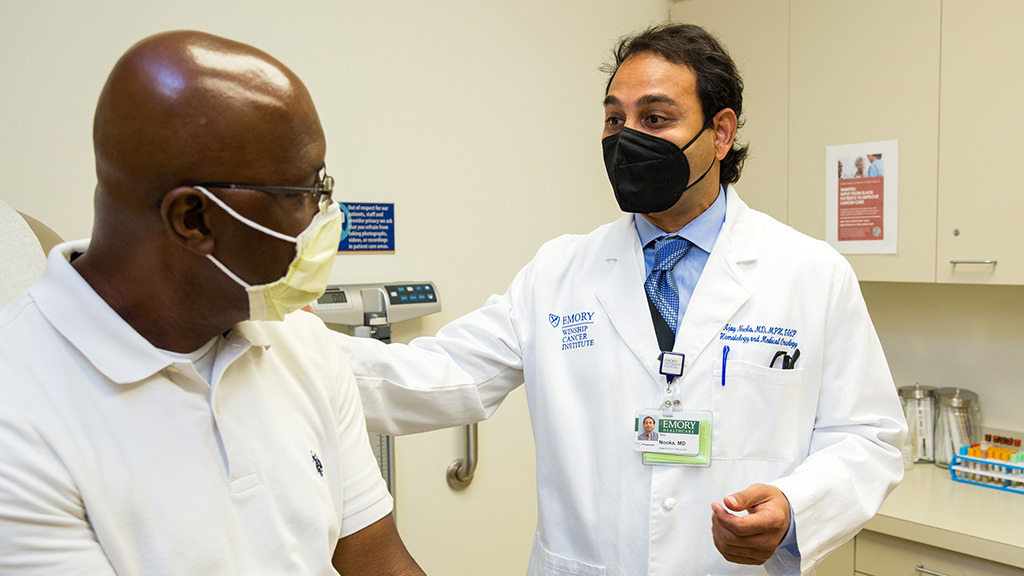Overview
The Division of Hematology is committed to excellence in research, education, and patient care.
Our mission is to provide the highest quality care for patients with benign and malignant hematological disorders, to develop novel therapies through translational research, and to train and mentor the next generation of hematologists.
Our faculty provide expert primary and consultative care for patients with a diverse spectrum of benign and malignant blood-related disorders that include:
- Disorders of red blood cells, white blood cells, and platelets
- Coagulation problems including hemophilia
- Acute leukemia (AML, ALL)
- Myeloma
- Hodgkin lymphoma
- Non-Hodgkin lymphoma
- Bone marrow failure disorders (aplastic anemia, paroxysmal nocturnal hemoglobinuria, myelodysplastic syndromes, LGL leukemia, pure red cell aplasia)
- Myeloproliferative disorders (polycythemia vera, essential thrombocytosis, chronic myeloid leukemia, systemic mastocytosis, myelofibrosis), B-cell malignancies (myelomas and lymphomas)
- Hemoglobinopathies including sickle cell anemia
The Division supports three distinct inpatient attending services at Emory University Hospital: leukemia, transplant, and lymphoma/myeloma. It also supports distinct inpatient consult services at Emory University Hospital, Emory University Hospital Midtown, and Grady Memorial Hospital, all of which, in addition to the attending services, are supported by advanced practitioners and also provide training opportunities for residents and hematology/oncology fellows.
For patients seeking hematology care, visit the Winship Cancer Institute website.
Research
One of the major activities of the division is research. Our faculty works at the cutting edge of molecular and cellular biology, pathophysiology, and applied clinical research.
Education
Our faculty actively participate in the hematology course in the Emory University School of Medicine, ranked the best course by second-year medical students. Our department's Hematology and Medical Oncology Fellowship Program prepares physicians for the subspecialty practice of hematology and for academic careers as researchers in the areas of hematopoiesis, hemostasis and thrombosis, marrow failure, myeloproliferative disorders, hemoglobinopathies and sickle cell disease, as well as hematologic malignancies.
Programs
Hematology faculty members comprise several programs and sections, including Leukemia and Myeloid Disorders, Lymphoma, Myeloma, Stem Cell Transplantation, Cell Therapy, Hemostasis and Thrombosis, and Hemoglobinopathies.
Leukemia and Myeloid Disorders
The Leukemia Program is a large and diverse regionally recognized center of excellence for the management of leukemia, myelodysplastic syndromes and myeloproliferative disorders. More than 300 new cases from Georgia and the greater Southeast region of the United States are referred annually to the leukemia program at Winship Cancer Institute. Research is a major component of the Leukemia Program, and leading-edge research is conducted daily by faculty members in areas that include: development of mouse models for human leukemias, development of mouse models to test new drug therapy, and development and clinical testing of novel drugs.
For patients seeking treatment for leukemia, visit the leukemia web page at Winship Cancer Institute's website.
Stem Cell Transplantation
We host one of the largest bone marrow and stem cell transplant programs in the southeast United States, and have active clinical programs in CAR T for acute lymphoblastic leukemia, lymphoma and multiple myeloma. This FACT-accredited program performs each year approximately 80 allogeneic transplants and over 375 autologous cases, including investigational and FDA-approved CART cell therapy.
Since 1978 when the first bone marrow transplant was performed at Emory, the Bone Marrow and Stem Cell Transplant Center at Winship Cancer Institute, has provided curative therapy for patients with cancer using combinations of high dose chemotherapy with bone marrow or blood stem cell transplants. The program's physicians are internationally known for research and treatment of blood cancers such as leukemia, lymphoma, and multiple myeloma. Participation in national, international and institutional clinical trials assures that the program offers patients the newest knowledge in T-cell immunotherapy, stem cell biology and transplant immunology.
For patients seeking clinical care with a bone marrow or stem cell transplant, visit the Winship Cancer Institute's website.
Hemostasis and Thrombosis
The Emory and Children's Healthcare of Atlanta Comprehensive Hemostasis and Thrombosis Center is one of the largest clinical programs of its kind in the United States. This program is uniquely organized with adult and pediatric interdisciplinary connection. The team consists of both adult and pediatric physicians, nurses, nurse practitioners, research coordinators, social workers and administrative staff. The goal of this program is to deliver outstanding care in a setting that is structured to permit the conduct of clinical and translational trials across all ages.
- To learn more about the pediatric program, visit Children's Healthcare of Atlanta website.
- To learn more about the clinical program for adults, visit Winship Cancer Institute's website.
Hemoglobinopathies
The Georgia Comprehensive Sickle Cell Center at Grady is the world's first 24 hour comprehensive primary care clinic for patients with sickle cell syndromes. This program located at Grady Hospital offers multidisciplinary care for more than 1200 patients with sickle cell through a dedicated team of physicians, nurses, physician assistants, nurse practitioners, clinic assistants, social workers, psychologists and a psychiatric clinical nurse specialist. The staff conducts clinical research aiming to improve the care of all patients through investigations involving new drugs and observational trials to expand knowledge about the disease. This program has a unique pediatric and adult interdisciplinary connection.
For patients diagnosed with sickle cell syndromes, visit Winship Cancer Institute's website.


